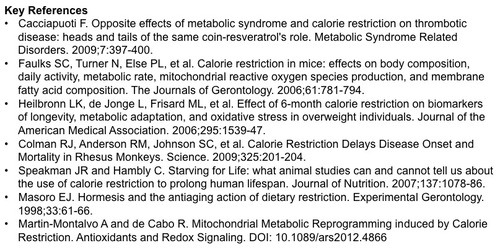Sage is here to help.
Feel like you could be eating better? Not sure what to change or where to look? Sage Nutritious Solutions make it easy for you to discover the wide, wonderful world of balanced, healthy, bangin' food.
Calorie Restriction = Longer + Healthier Life?
As early as the 16th century, humans have been fascinated with the idea of "the fountain of youth." Since then, people have made great attempts at lengthening their life span, all the while hoping to maintain optimal health as long as they can. Recent studies have suggested calorie restriction (CR) as a possible way to delay or prevent the onset of many aging-related conditions with increased longevity and health span. CR is defined as a 10-40% reduction in intake of a nutrient-rich diet. This restricted diet has been used extensively and exclusively in research to understand the effects intake has on healthy length of life.
Calorie restriction has been linked to stimulate specific proteins that lessen the effects of metabolic syndrome; through this, there may be a delay in onset and progression of chronic diseases associated with this condition, such as diabetes, cardiovascular disease, heart attack. stroke, and kidney failure. This same protein also helps to reduce fat storage, decrease the inflammatory response (which is associated with a gamut of life-threatening conditions), and increase insulin sensitivity (which is good when someone is at risk for type-2 diabetes). In animal studies, CR was found to have an effect against degeneration of neurons associated with Huntington’s disease, Alzheimer’s disease, Parkinson’s disease, and stroke. It was also reported that CR might increase the ability of the brain to resist cognitive decline, but how is still unknown.
CR may also reduce oxidative stress, which can cause development of age related conditions including diabetes, cardiovascular disease, cataracts, stroke, kidney disease, and liver failure. Oxidative stress can also lead to increased incidence of atherosclerosis, rheumatoid arthritis, neurodegenerative disorders, and certain cancers. Because most oxidative stress occurs in the mitochondria within the cells, they play an important factor in determining longevity.
Mitochondrial dysfunction naturally increases with age; it can start the process in which a number of diseases develop: cataracts, diabetes, obesity, inflammation, hypertension, atherosclerosis, Parkinson’s disease, Alzheimer’s disease, nervous system deterioration, muscle breakdown, and chronic fatigue syndrome, just to name a few. In animal studies where CR was implemented, it has been demonstrated that even a short duration of two weeks had a significant effect in improved mitochondrial function. A suggested explanation of this could be CR’s effect of increasing functionality of mitochondria.
Perhaps the most compelling example of this took place over a 20-year study on rhesus monkeys. This study assessed mortality, age-related survival, and incidence of disease. In their analysis of 76 animals, it concluded that 37% of controls died of age-related causes compared to 13% of the CR group. The incidence of chronic diseases including cancer, cardiovascular disease, and diabetes were decreased in the CR group compared to controls. The study determined that CR significantly altered the aging effect in the intervention group and further promoted survival of this species by brain preservation. A picture of the physical evidence in this study is seen below:

It is important to know that there is no replacement for CR. Those who wish to reproduce this effect may recommend intermittent fasting (discussed HERE), liposuction, intake of resveratrol supplements, and even the pharmaceutical drug Metformin. None of these have significant enough results to warrant recommendation for longevity, despite mixed research evaluating their individual benefit. In addition, it is very hard to maintain this strict dietary regimen for the long term. Overall, modest calorie intake and weight loss are already well-established clinical recommendations used to promote health and reduce chronic disease risk; however, the intentional reduction of caloric intake is not adequately well founded to provide the basis for personal recommendations. Weight loss in elderly individuals of healthy weight may be indicated as harmful. In this case, the risks may outweigh the potential benefits. Always speak with a physician and dietitian before undergoing any weight loss regimen, especially ones that have inherent health risks.
Happy Eating!


